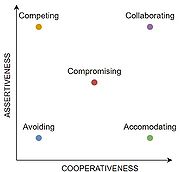Conflict Management using the Thomas-Kilmann Conflict Mode Instrument (TKI)
Contents |
Abstract
Conflicts are common when working with other people on projects, programs, and portfolios. They should not necessarily be avoided since they can provide great value to team members and improve the final product. However, it is of great importance that team members and not least the project manager knows how to manage the conflicts appropriately to avoid that the conflict escalates and becomes inconvenient to the work [1]. (Project Management Institute, Inc. (PMI), 2021)
This article will introduce the Thomas-Kilmann conflict mode instrument (TKI), developed by Kenneth W. Thomas and Ralf H. Kilmann. The purpose of the tool is to identify a person’s most used conflict handling modes and learn to manage conflicts (Kilmann, 2011).
The article will also introduce the correlation between the Myers-Briggs Type Indicator (MBTI) assessment and the TKI assessments, meaning that certain personality types tend to use certain conflict handling modes more frequent (Kilmann & Thomas, 1975).
Big Idea
Conflicts in project management
When working with projects, several competencies are relevant for the project managers to have. Technical competencies, to be able to direct, manage, plan, and deliver a project. (4). Business competencies, to be able to manage organizational, contractual, and external environment. And finally behavioral competencies, associated with leadership, team building, negotiation, and conflict management. Conflicts are defined as _____.
A lot of people are involved on projects creating a dynamic environment, and the projects are often faced with many exclusive constraints such as budget, scope, schedule, and quality (1). These factors make conflicts common on projects– and almost inevitable. Trying to avoid conflicts is not necessarily the best solution, since it can restrict the communication between the parties involved and lower the creativity. When addressing conflicts appropriately, they can be healthy and lead to a more productive process, better decision making and stronger solutions. The trust among project team members can also increase and cause a deeper commitment to the project. However, if conflicts are addressed inappropriately, they are unhealthy, can escalate, and can affect the project team members with reduced morale, motivation, and trust.
The TKI assessment
- A general introduction to the tool
- Describing the two dimensions; Cooperativeness and assertiveness
- Describing the five conflict modes; Competing, collaborating, compromising, avoiding, and accommodating
- Describing the two diagonals; integrative and distributive dimension
The TKI assessment and the MBTI assessment
- Connecting the personality test (MBTI) with the conflict handling mode
Application
How to take the TKI assessment
Implementation of TKI in conflict management
- From assessment to effective behavior (5 Steps)
Examples
- Positive and negative ways of using the five handling modes
Limitations
- Design of the assessment – the social desirability response bias
Annotated bibliography
- ↑ Project Management Institute Inc. (PMI). A guide to the Project Management Body of Knowledge. 7th edition, (Project Management Institute, Inc. (PMI), 2021).
